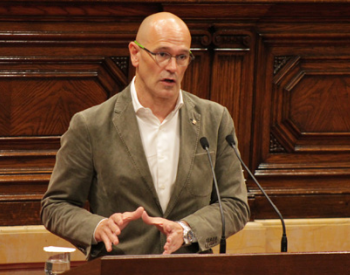- The Law on the Catalan Community Abroad was passed this week by the Parliament of Catalonia with support of Junts pel Sí, CUP, CSQP and the PSC
- For the first time, the Law recognises individual Catalan citizens living abroad as subjects with rights and responsibilities
- Romeva: “We want Catalans living abroad to feel even closer and, most importantly, necessary to our country”

On Wednesday the Catalan Parliament passed the Law on the Catalan Community Abroad with the support of the parliamentary groups Junts pel Sí, CUP, CSQP and the PSC. The passing of this Law by the legislative body is a step forward in recognising the rights and responsibilities of Catalans living abroad, which haves been demanded by citizens for many years. For the first time, the Law recognises individual Catalan citizens living abroad as subjects with rights and responsibilities in the Catalan Government’s sphere of authority.
During the parliamentary session, the Minister for Foreign Affairs, Institutional Relations and Transparency, Raül Romeva, explained that the new Law “will better serve the needs of the community of Catalans living outside of Catalonia, and will also enhance relations with Catalan communities, who have always been an example of cohesion”. “We want Catalans living abroad to feel even closer and, most importantly, necessary to our country”, he added.
With this new Law, and from a “standpoint of consensus with the parliamentary parties and other institutions”, Romeva contended that it was possible “to enlarge and improve our judicial body that regulates our actions abroad” while “emphasising our institutional commitment to Catalonia Abroad with new tools that are essential to exercising our responsibilities as a Government”.
With this new Law, and from a “standpoint of consensus with the parliamentary parties and other institutions”, Romeva contended that it was possible “to enlarge and improve our judicial body that regulates our actions abroad” while “emphasising our institutional commitment to Catalonia Abroad with new tools that are essential to exercising our responsibilities as a Government”.
The new features of the Law on the Catalan Community Abroad
In order to underpin this new framework of relations, the Law improves the Register of Catalans Abroad that was created in 2014 and its functions, a task that the Government has already embarked on with the provision of services in the fields of health, culture and youth for registered Catalans. The Law also states its determination to make the Register a more precise instrument that will facilitate the creation of public policies aimed at this group. The Register is also a tool that makes it possible for the people on it to exercise their rights and receive certain services, while at the same time providing the Government with information on the needs and demands of the Catalan community living abroad.
The Law also proposes policies to encourage the use of the Catalan language abroad through educational resources and to facilitate the participation of Catalans living abroad in social and labour information services and the public employment service.
Furthermore, the Law provides for a comprehensive Catalan emigration policy with policies that provide support and advice on the international mobility of Catalan citizens. By the same token, it maintains their bond with Catalonia and, where necessary, facilitates their voluntary return at a later date.
The Law on the Catalan Community Abroad also promotes the international projection of Catalonia through its citizens living abroad in their role as active agents in disseminating the political, social, economic and cultural reality of Catalonia.
Furthermore, the Law provides for a comprehensive Catalan emigration policy with policies that provide support and advice on the international mobility of Catalan citizens. By the same token, it maintains their bond with Catalonia and, where necessary, facilitates their voluntary return at a later date.
The Law on the Catalan Community Abroad also promotes the international projection of Catalonia through its citizens living abroad in their role as active agents in disseminating the political, social, economic and cultural reality of Catalonia.
Until now, Catalan communities abroad have been regulated by a law from 1996 that only defined the Catalan Government’s relationship with institutions, but not with its citizens living abroad. The text passed this week now also regulates relations with its citizens living abroad and endows them with rights and responsibilities.
Furthermore, the creation of the Council of Catalonia Abroad as the government’s collegiate advisory and consultancy body for the external participation of Catalan citizens and communities living abroad. The creation of this Council further underlines the new viewpoint of Catalonia Abroad established by the Law.
Furthermore, the creation of the Council of Catalonia Abroad as the government’s collegiate advisory and consultancy body for the external participation of Catalan citizens and communities living abroad. The creation of this Council further underlines the new viewpoint of Catalonia Abroad established by the Law.